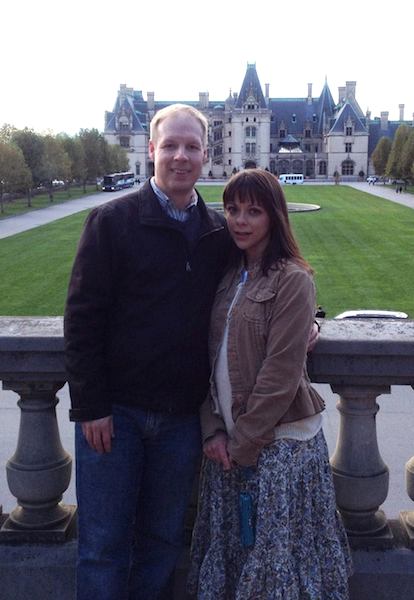On August 5th, Kristen and I celebrated our 20th wedding anniversary. Since we’re in the grip of a global pandemic, it wasn’t the celebration we had envisioned or have been saving for. (We had leftovers, exchanged gifts, and watched a movie while a friend took the girls out for a couple of hours). But no matter how unconventional or unremarkable it may have been, we did celebrate because this was a significant milestone on a momentous journey. For two decades, we’ve done life together. We’ve made life together. All along the way, we’ve had ups and downs; we’ve rejoiced and we’ve grieved; we’ve held hands and butted heads. We’ve laughed and cried and forgiven and been forgiven. And all along the way, love has been the bond that’s held us together in the warmth of the sun and the tumult of the storms. Supporting and accompanying each other through all that life can throw at you – that’s the joy, the blessing, and the challenge of a loving relationship.

One of the lessons any couple learns quickly is that the reality of love is very different from the idea of love. All of us long to be loved, to give love, to receive love, to know love. To discover and experience that depth of connection and validation, of belonging. But there’s a reason why spouses make vows to each other. Love is work.

Love means learning to walk with someone, grow with someone, and keep going with someone even when the road gets rough, even when the road leads you off the map. It means continuing the journey no matter the weather. Love is more than a feeling, an attraction, an emotion. It’s a bond: a bond that you forge together. A bond that inspires you, compels you to put the wants, needs, interests, and well-being of your beloved on par with if not ahead of your own. And you do it because that bond, that love produces life: it gives you life, it enriches your life – no matter the condition of the road or the state of the weather.
This connection between love and life lies at the heart of the gospel, in fact. The invitation that Jesus extends to us is an invitation to life – the life that truly is life; life abundant; life eternal. And so it really shouldn’t be a surprise to find that love lies at the centre of Jesus’ message and Jesus’ mission.
Jesus makes the connection between love and life clear in His framing of the Greatest Commandment, especially in Luke’s presentation of it. The question put to Jesus in Luke chapter 10 is, “Teacher, what must I do to inherit eternal life?” Jesus responds to the eager lawyer, “What do you read in the law?” The lawyer answers, “Love the Lord your God with all your heart, all your soul, all your strength, and with all your mind; and love your neighbour as yourself.” Jesus replies, “You have answered correctly. Do this and you will live.”
Love, and you will live. Not just in the hereafter, but in the here and now.
In the Kingdom of God, in this coming alternative reality that has come near in Jesus, love is the centre of gravity. Love of God and neighbour is the core that generates the magnetic field that orients us toward heaven and aligns our hearts, our minds, our souls, our strength with the ways of heaven. Love of God and neighbour leads us to relate to God, to ourselves, to each other in accordance with God’s will on earth as it is in heaven.
“Love of God and neighbour is the core that generates the magnetic field that orients us toward heaven and aligns our hearts, our minds, our souls, our strength with the ways of heaven.”
Love of this scope and scale is the very reason Jesus came to walk among us, and walk with us. To be Emmanuel: God with us! To be our rabbi, to be our Lord, to be our Saviour, to be our brother. “For God so loved the world that God gave God’s only begotten Son that whosoever believes in Him shall not perish but have everlasting life” (John 3:16). Love is what the message of the gospel always comes back to and comes down to.
This is the point that Matthew seeks to drive home in his framing of the Greatest Commandment. “Love the Lord your God with all your heart, and with all your soul, and with all your mind.’ This is the greatest and first commandment. And a second is like it: ‘You shall love your neighbour as yourself.’ On these two commandments hang all the law and the prophets,” Jesus declares (Matthew 22:34-40).

On these two commandments hang all the law and the prophets. In other words, love is the trunk from which all the words and instructions and admonitions – all the substance, all the weight, all the meaning – of the Law and the prophets branch off. We have to be sure not to overlook the tree in our admiration of the leaves and the blossoms.
And yet we do. All of us have a lot of leaves from this tree pressed into our Bibles or in our journals or in other places where we keep special things; leaves that we frequently pull out and revisit and admire and even show to others: verses and doctrines that are important to us. And they are important. They’re beautiful. They’re of God. But they’re also so very often presented and interpreted detached from the branch, from the trunk that gave rise to them. Which means that, however unintentionally, we tend to treat them as individual specimens rather than extensions of something larger, something connected, something alive, something that helps us climb toward God in heaven but also grounds us to the earth, to the world, to love that is the core, the root, from which the whole tree springs.
Love is the root, love is the soil; love is all of it when it comes to the gospel.
The Apostle Paul recognises and grasps the primacy of love perhaps more firmly than anyone since Jesus has – and he wanted present and future generations of disciples to grasp it, too. This realisation compelled Paul to tell both the Romans and the Galatians that the whole law can be summed up in this one instruction: love your neighbour as yourself (Galatians 5:14, Romans 13:9). And it inspired him to produce one of the most eloquent and beautiful leaves to be found among the branches of the gospel: 1 Corinthians 13.
What makes 1 Corinthians 13 particularly beautiful is that it is a leaf that points us back to the branch, to the trunk, to the root even if we pluck it and press it and keep it separate.
If I speak in the tongues of mortals and of angels, but do not have love, I am a noisy gong or a clanging cymbal. And if I have prophetic powers, and understand all mysteries and all knowledge, and if I have all faith, so as to remove mountains, but do not have love, I am nothing. If I give away all my possessions, and if I hand over my body so that I may boast, but do not have love, I gain nothing.

The trouble is we tend to keep this pressed leaf tucked away until a wedding comes around. Certainly it is a fitting text for a couple about to be married to hear and embrace, especially as it continues:
Love is patient; love is kind; love is not envious or boastful or arrogant or rude. It does not insist on its own way; it is not irritable or resentful; it does not rejoice in wrongdoing, but rejoices in the truth. It bears all things, believes all things, hopes all things, endures all things. Love never ends.
However, Paul wasn’t writing these words to brides and grooms. He was writing to the church – to the whole church – at Corinth. This is the heart of what the apostle was trying to drive home to this church riven by factions and indifference toward one another. He wasn’t intending it for weddings, or even for special occasions. This is advice for every day. Yet, of all the Scripture verses and passages we’ve been encouraged to commit to memory, 1 Corinthians 13 is seldom among them.
Why might that be? If speaking in tongues and understanding the ins and outs of theology and having faith to say to a mountain, “Be cast into the sea” – if all of that amounts to nothing without love, why wouldn’t we put love ahead of all of those things in our faith practice, in our faith desire?
Well, for one thing, it’s a bit daunting this Greatest Commandment. What Jesus presents to us in Matthew 22 as the core, the heart, of what heaven is about; the distilled essence of what God asks, expects, and desires for us and from us is much more than a warm, fuzzy emotion to feel or a sunny disposition to display toward God and neighbour. Loving the Lord with all of our heart, mind, soul, and strength – with our whole selves – and loving our neighbours as ourselves: That takes focus and effort. That takes commitment. That’s a love that makes demands on us. And if we have a spouse, if we have children, if we have dear friends whom we love with that kind of love, we know how much time and effort that depth of love requires. How can we possibly love God and all our neighbours on that level? We only have so much bandwidth, so much time.
I honestly believe God recognises that. I don’t think Jesus is asking us to love everyone the same way we love our spouse or our children; but I do think Jesus is asking us not to shirk or shy away from the work. Yes, love makes demands of us. But those demands are where the joy and the growth – and the life – are to be found. I can honestly say that I love Kristen more at this stage of the journey than I did when first set out – and the challenge, the work, the dedication the journey has required is a big part of the reason why.

If love is love, it is always more than an emotion or a disposition. It always makes demands of us. Love is a posture we assume – a stance we adopt in relationship to God and neighbour. To see God as worthy of our all. To see our neighbours as worth getting to know. To see our neighbours as valuable, as worthy of respect, as people just like us with hopes and dreams and promise; people just like us created in the image of God, who have the breath of God and the light of heaven coursing, pulsing within them.
It is from this stance, then, that we move, act, and live in the world and live with God as an act of worship. Our stance, our actions are what really show and prove our love – and our faith. We do not and will not always get it right. But we learn as we go and as we grow. And Jesus gets that, too, because Jesus operates from this same stance.
That, by the way, is why I take the Bible at its word in what it has to say about God and Jesus. The Bible’s declaration that God is love validates and affirms the incarnation. It makes the story of Jesus make sense. And vice versa. The story of Jesus validates and affirms the Bible’s declaration that God is Love. A God who is love would not and could not remain transcendent. Absence may make the heart grow fonder, but love longs to be present with the beloved: To give oneself fully to the beloved; to give oneself for the beloved if need be. Which is precisely what Jesus does. In Jesus, God does the things love does. In Jesus, God models for us the ways of Love so that we can learn the ways of heaven. The ways of love and the ways of heaven are one and the same!
“In Jesus, God does the things love does. In Jesus, God models for us the ways of Love so that we can learn the ways of heaven. The ways of love and the ways of heaven are one and the same!”
To begin walking in the ways of heaven, we have to start by changing our approach to Bible passages like Matthew 22:34-40, like 1 Corinthians 13:1-13. We have to view these seminal passages as more than leaves plucked from the gospel tree to be treasured as spiritual keepsakes. Rather, we must understand these passages as frames carved from the wood of the trunk of the gospel tree and offered for our use. Not picture frames, mind you, but as sifting frames. So what’s a sifting frame?
The summer after Kristen and I met, I took a field archaeology class at Old Salem in my home town of Winston-Salem, North Carolina. Moravian pietists founded Old Salem in the mid-18th century and the historic area of the town is preserved as a living museum. It’s a beautiful and tranquil place to visit. Researchers working for Old Salem had discovered that one of the historical houses had been moved back from the street at some point in the late 19th century. As part of their ongoing preservation and restoration work, Old Salem planned to move the house back to its original location. Before doing so, however, they wanted to undertake an archaeological exploration of the property.

It was fascinating though painstaking work. Archaeology is slow and meticulous, proceeding by the centimetre as long as time allows. Toward the end of the term, when we were running out of time to complete the work, we started excavating with more urgency and less precision. We began moving dirt in the cellar with shovels rather than trowels. But the soil still needed examining. So at the back of the property the lead archaeologists set up a large sifter: a rectangular wooden frame made from two by fours with a fine mesh screen stapled to the bottom. Every shovel full of dirt was dumped into this sifter and, working in pairs, my fellow students and I took turns pushing the sifter back and forth so that the loose soil would fall through but any nails, potsherds, or other artifacts of potential interest would reveal themselves and remain on the screen.
This is what the Apostle Paul is trying to impress upon the 1st century church in Corinth, and upon us as the 21st century church in Toronto: Love is what the people of Jesus use to sift our thoughts, our experiences, our attitudes, our politics, our philosophies, our theologies, our faith practice, our life practice – everything – in pursuit of the gospel. Love reveals what’s truly important and what is ultimately extraneous, that which we can allow to fall away. Love doesn’t always show us what to do with the important discoveries we make – but it does show us where we need to direct our focus. And that’s what the journey of discipleship is all about: a journey of discovery – of God, of self, of the world – of the life that truly is life. Life rooted in love of God and neighbour.
Yes, it is work. Yes, it is commitment. Yes, it is sacrifice. But, most of all, it is life. Abundant life. And that abundance of life isn’t just something Jesus wants to give us; it’s something He wants to share with us. Because that’s the kind of thing love does.
Thanks be to God for this divine, excelling love. Amen.
This post is a Remix of this sermon, “Love Each Other”




























